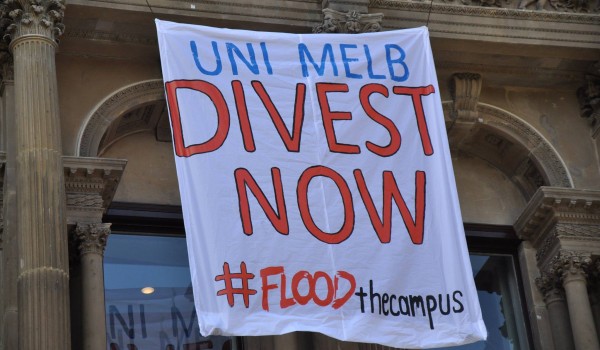‘Flood the Campus’ sets 30 day deadline for divestment

Activists calling for the University of Melbourne to divest from fossil fuel companies launched their “Flood the Campus” campaign on Tuesday 15th March, unfurling a banner from the Old Commerce (west facing) façade of the Melbourne School of Design building. The banner remained there for just under 24 hours before being removed by University security.
The campaign calls for the University to firmly commit to divestment within 30 days, setting 15th April as a deadline. If the University doesn’t meet that deadline, Flood the Campus has committed to taking “bold action”. What this action is remains shrouded in mystery, although the campaign’s website obliquely refers to civil disobedience, and a campaign spokesperson told us that the action would “make the issue impossible to ignore”.
The launch was coördinated with campaigns in six other Australian universities, namely, Monash, the Australian National University, Queensland University of Technology and the universities of Sydney, New South Wales, and Queensland.
“Divestment” refers to the University selling off its investments (in practice, stock ownership) in fossil fuel intensive industries. The campaign is targeting the top 200 companies which own reserves of coal and gas. Although the University’s general operating costs are paid for on a year-to-year basis through student fees and research grants, it also maintains an investment fund, valued at around $1.3 bln.
A variety of voices, staff and student, within the University community have been calling on the University to divest its portfolio from fossil fuel businesses for some years. Fossil Free Melbourne University (FFMU), a central coördinating group for activists pushing for divestment, was founded in 2013.
The University has generally proven reticent to divest, with Vice-Chancellor Glyn Davis writing to all staff in early 2014 to address the Fossil Free campaign and setting out the case for the University’s decision not to divest its portfolio. The Vice-Chancellor cited in particular difficult market conditions, as well as the responsibility the University had as the trustee of donated funds, and discussed whether the University owed a duty to maximise returns on money it had been entrusted with.
In that email, Davis also set out the University’s funds management structure: rather than directly managing its portfolio, the Victorian Funds Management Company (VFMC) is responsible for day-to-day decisions, and the University has an Investment Management Committee tasked with oversight of the VFMC.
Since then, the campaign has not relented. The Australian National University announced in late 2014 that it would partially divest, by selling its stake in seven companies after a review assessing its Socially Responsible Investment Policy.
The University of Melbourne has also shifted, with the latter half of last year seeing the release of a draft Sustainability Charter, which was subject of a consultation process. The final release of the Charter was on Friday, 18th March.
However, the Charter is an aspirational statement, and a commitment to divestment would only come in the Sustainability Plan, for which there is a five-month development and consultation process planned. Flood the Campus has criticised similar processes at all seven Universities as “tr[ying] to distract us with so-called consultation”. Anisa Rogers, a spokesperson for the campaign being run at Melbourne, told us there was “a lot of frustration from the university community” about how slow the University had been to run the process.
Rogers is one of the University of Melbourne Student Union (UMSU)’s Environment Officers this year, although the UMSU Environment department is not formally affiliated to FFMU or Flood the Campus, which are run independently. Despite this, the Department does provide practical support for the campaign, with FFMU members often using the Department’s resources.
Rogers said “it is time for us to take things into our own hands as we have been waiting on the university to engage with us in a meaningful way for too long, and urgency for action around climate change gets more pressing each month.”
The wheels of the University’s glacial bureaucracy are turning on this issue, and perhaps the Sustainability Plan will bring success for Flood the Campus. Rogers said the bold action planned was a “last resort” and that Fossil Free Melbourne University felt it had exhausted all other options to get the University to listen.